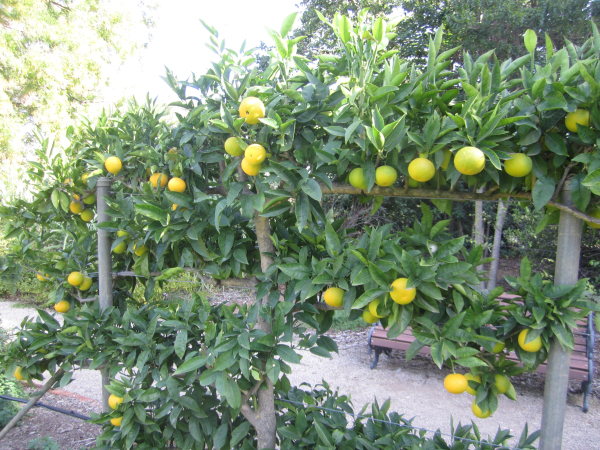
Apples, pears, apricots, olives, plums, citrus, nectarines, and pomegranate, are just some of the many espaliered fruit trees you can grow. It is important to select a location that will provide at least 6 hours of direct sunlight, otherwise you may find the tree doesn’t set fruit. A key to success is to prepare the area by digging in organic compost and aged manure.
How to Espalier Fruit Trees
If you were to only grow one fruit tree, I would suggest a lemon as its fruit has a multitude of uses and can be included in your favorite recipes. Homemade lemon cordial is a winner in our home. The best variety is a thorn-less lisbon which produces an abundant crop over a long period. If you live in a warm district, eureka is a good choice.
My experience with nectarines purchased from fruit and veg shops is that they look good but are low on flavour. Goldmine is a white fleshed variety that produces small but extremely sweet fruit and could happily be espaliered on a shed wall or rear fence.
To save on space, you may consider planting another similar growing variety in the same hole. Planting in duo is also beneficial as some trees. These trees require a different variety to cross-pollinate, for example, red fuji and Jonathon apples or Japanese plums like santa rosa and Satsuma are excellent cross-pollinators.
Espalier trees are often trained to form a well balanced structure that can create a good focal point in your garden. They can also be less formal in their presentation, as long as the tree is trained to grow flat by encouraging lateral growth.
If you choose to espalier a stone fruit visit nurseries in winter when they have a wide selection. A range of fruit trees are now also available on dwarf growing root stock, which encourage a more compact size tree, but still produces a good crop.
For more information visit the Flemings Nurseries website.
How to Maintain Espaliered Fruit Trees
Maintaining espaliered fruit trees in commercial spaces requires regular pruning, training, and care to keep them healthy and productive. Hiring open space maintenance professionals ensures the trees are managed correctly, saving time while preventing damage from improper techniques. With expert attention from the Programmed Property Services’ team of open space horticulturists, your espaliered trees will remain a long-lasting, attractive feature that enhances the landscape and provides consistent growth with minimal hassle.
Easy Lemon Cordial Recipe
- 1.5Kg caster sugar
- Zest and Juice of 7 lemons
- 1 Litre boiling water
- ¼ cup (60g) citric acid
*Makes 2 Litres
Instructions
- Combine all ingredients in a large bowl.
- Stir well until sugar has dissolved.
- Stand covered for 3 hours or overnight.
- Strain into sterilised bottles to store. Keep in a cool place.
- Serve as per ‘normal’ cordial with water or sparking mineral water.
Espalier Fruit Trees FAQs
-
What is the effect of espalier?
Espalier is the technique of training fruit trees to grow flat against a wall, trellis, or framework. The effect is both practical and decorative—trees take up less space, receive better sunlight exposure, and often produce more consistent fruit. It also adds an attractive design element to gardens or commercial landscapes while making maintenance and harvesting easier.
-
What is the fastest fruit tree to bear fruit?
The fastest fruit trees to bear fruit are usually fig, peach, and mulberry, often producing within two to three years of planting. Dwarf varieties of citrus can also fruit quickly under the right conditions. Choosing fast-bearing trees is ideal for those wanting quicker harvests, especially in smaller backyards or commercial properties where results are valued sooner.
-
What is the fastest decaying fruit?
Berries, particularly raspberries and strawberries, are among the fastest decaying fruits due to their high moisture content and delicate skin. They can spoil within a few days if not stored properly. Other fruits like bananas and peaches also ripen and decay quickly in warm conditions. Proper storage, refrigeration, and timely use help extend their freshness and reduce waste.





